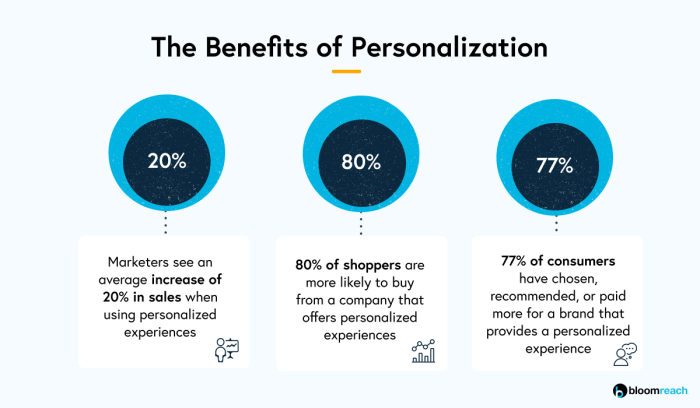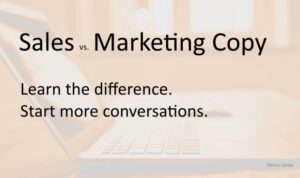Personalization in Marketing sets the stage for creating tailored and impactful campaigns that resonate with consumers on a deeper level. From understanding the essence of personalized marketing to exploring innovative trends, this topic delves into the dynamic realm of connecting brands with their target audience in a more personalized way.
As we delve further into the intricacies of personalization in marketing, we uncover the key components that drive successful customer engagement and loyalty, ultimately shaping the future of marketing strategies.
Definition of Personalization in Marketing

Personalization in marketing is all about tailoring your marketing efforts to meet the specific needs and preferences of individual customers. It involves using data and insights to create targeted and relevant messaging that resonates with each consumer on a personal level. By delivering personalized experiences, businesses can enhance customer satisfaction, drive engagement, and ultimately increase sales.
Examples of Personalized Marketing Strategies
- Dynamic Content: Customizing website content based on user behavior and preferences.
- Email Marketing: Sending personalized emails with product recommendations or special offers.
- Personalized Recommendations: Using algorithms to suggest products based on past purchases or browsing history.
- Geo-targeting: Showing location-specific ads or promotions to customers in different regions.
The Importance of Personalization in Marketing
Personalization in marketing is crucial for building strong relationships with customers and driving loyalty. By showing that you understand and care about their individual needs, you can create a more meaningful connection that leads to repeat business and positive word-of-mouth referrals. In today’s competitive landscape, personalized marketing is not just a nice-to-have but a necessity for staying ahead of the curve.
Benefits of Personalization in Marketing
Personalization in marketing offers numerous benefits that can significantly impact a company’s success. From improving customer engagement to boosting conversion rates, the advantages of personalized marketing strategies are undeniable.
Improved Customer Engagement, Personalization in Marketing
Personalized marketing allows businesses to tailor their messages and offers to individual customers based on their preferences, behaviors, and past interactions. By delivering relevant content to each customer, companies can capture their attention and create a more meaningful connection. This tailored approach not only increases engagement but also helps build trust and loyalty with customers.
Enhanced Customer Loyalty
When customers feel understood and valued by a brand, they are more likely to remain loyal and continue doing business with that company. Personalization creates a sense of exclusivity and special treatment, making customers feel appreciated and respected. By consistently providing personalized experiences, businesses can strengthen customer relationships and foster long-term loyalty.
Impact on Conversion Rates
Personalized marketing has a direct impact on conversion rates by driving more targeted and relevant interactions with customers. By delivering personalized recommendations, product suggestions, and promotions, companies can increase the likelihood of customers making a purchase. The tailored approach of personalized marketing ensures that customers receive the right message at the right time, leading to higher conversion rates and ultimately, increased revenue.
Techniques for Implementing Personalization

Implementing personalization in marketing involves various techniques to collect customer data, utilize tools and technologies, and leverage AI and machine learning. Let’s explore some of these methods below.
Collecting Customer Data for Personalization
- Utilizing website analytics to track customer behavior, preferences, and interactions.
- Implementing customer relationship management (CRM) systems to gather and organize customer data.
- Using social media listening tools to monitor and analyze customer conversations and feedback.
- Conducting surveys, feedback forms, and polls to directly collect customer preferences and opinions.
Tools and Technologies for Personalizing Marketing Campaigns
- Email marketing platforms like Mailchimp and Constant Contact for personalized email campaigns.
- Customer data platforms (CDPs) such as Segment and BlueConic for centralizing and managing customer data.
- Personalization engines like Monetate and RichRelevance for dynamic content customization based on user behavior.
- Ad retargeting tools such as AdRoll and Criteo for delivering personalized ads to target audiences.
Role of AI and Machine Learning in Personalizing Marketing Strategies
AI and machine learning play a crucial role in personalizing marketing strategies by:
- Analyzing large volumes of customer data to identify patterns and predict future behavior.
- Creating personalized product recommendations based on individual preferences and past interactions.
- Automating the delivery of personalized content across various marketing channels in real-time.
- Optimizing marketing campaigns by continuously learning and adapting to customer responses and feedback.
Personalization Trends in Marketing
In today’s fast-paced digital world, personalization in marketing has evolved to new heights. Let’s delve into some of the current trends shaping the landscape of personalized marketing.
Hyper-Personalization
Hyper-personalization takes personalization to the next level by leveraging advanced technologies such as artificial intelligence and machine learning. This trend involves creating highly customized and individualized experiences for each customer based on their preferences, behaviors, and past interactions with the brand. By analyzing vast amounts of data, companies can tailor their marketing messages and offers in real-time, leading to higher engagement and conversion rates.
Impact of Data Privacy Regulations
With the increasing focus on data privacy and security, regulations such as the GDPR and CCPA have a significant impact on how companies collect, store, and use customer data for personalized marketing. Stricter regulations require businesses to be transparent about their data practices, obtain explicit consent from customers, and provide options for data control. While these regulations pose challenges for marketers, they also promote a more ethical and responsible approach to personalization.
Future of Personalization in Marketing
The future of personalization in marketing is undoubtedly exciting, with advancements in technology enabling even more sophisticated and targeted strategies. AI-powered algorithms will continue to drive personalization efforts, predicting customer behavior and preferences with higher accuracy. As consumers demand more relevant and personalized experiences, brands that can deliver seamless and tailored interactions will stand out in the competitive landscape. The key lies in striking the right balance between personalization and privacy, ensuring that customers feel valued and respected throughout their journey with the brand.





